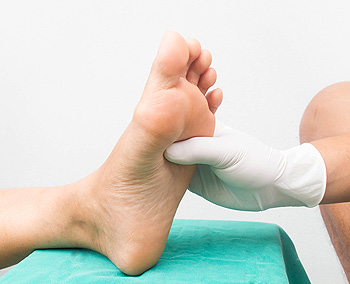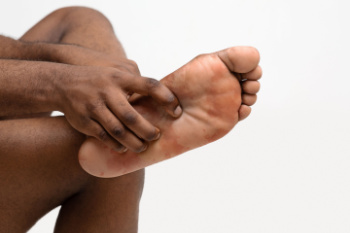February 2025
Managing Neuropathy

Neuropathy, or nerve damage, is a common complication of diabetes, although it can also result from other conditions like alcohol abuse or certain medications. It often affects the feet and legs, causing a range of symptoms. People with neuropathy may feel a tingling, burning, or numb sensation, which can make walking or standing uncomfortable. In more severe cases, the pain may be sharp or stabbing, and the feet may look red, swollen, or develop sores. The primary cause of diabetic neuropathy is high blood sugar, which damages the nerves over time. Managing blood sugar levels is key to slowing progression. Certain medications may be prescribed to relieve pain and discomfort. A podiatrist plays an important role in managing neuropathy by regularly monitoring foot health, checking for wounds, and providing pain relief strategies. They can offer custom orthotics, recommend specialized footwear, and help with wound care if neuropathy has caused skin damage. If you have neuropathy, it is suggested that you schedule an appointment with a podiatrist fo relief tips.
Neuropathy
Neuropathy can be a potentially serious condition, especially if it is left undiagnosed. If you have any concerns that you may be experiencing nerve loss in your feet, consult with one of our podiatrists from Piedmont Podiatry Associates. Our doctors will assess your condition and provide you with quality foot and ankle treatment for neuropathy.
What Is Neuropathy?
Neuropathy is a condition that leads to damage to the nerves in the body. Peripheral neuropathy, or neuropathy that affects your peripheral nervous system, usually occurs in the feet. Neuropathy can be triggered by a number of different causes. Such causes include diabetes, infections, cancers, disorders, and toxic substances.
Symptoms of Neuropathy Include:
- Numbness
- Sensation loss
- Prickling and tingling sensations
- Throbbing, freezing, burning pains
- Muscle weakness
Those with diabetes are at serious risk due to being unable to feel an ulcer on their feet. Diabetics usually also suffer from poor blood circulation. This can lead to the wound not healing, infections occurring, and the limb may have to be amputated.
Treatment
To treat neuropathy in the foot, podiatrists will first diagnose the cause of the neuropathy. Figuring out the underlying cause of the neuropathy will allow the podiatrist to prescribe the best treatment, whether it be caused by diabetes, toxic substance exposure, infection, etc. If the nerve has not died, then it’s possible that sensation may be able to return to the foot.
Pain medication may be issued for pain. Electrical nerve stimulation can be used to stimulate nerves. If the neuropathy is caused from pressure on the nerves, then surgery may be necessary.
If you have any questions, please feel free to contact one of our offices located in Greenville, and Easley, SC . We offer the newest diagnostic and treatment technologies for all your foot care needs.
How to Properly Fit Shoes

Fitting shoes correctly is essential for comfort and foot health. Shoes should fit snugly around the heel and midfoot without causing pressure or rubbing. The toe box should offer enough room for the toes to move freely without feeling cramped. While trying on shoes, it is important to ensure that the toes do not touch the end of the shoe, as this can cause discomfort and may gradually lead to foot problems. Ideally, there should be about a half-inch of space between the longest toe and the shoe’s front. The concept of breaking in shoes is real but limited. While new shoes may feel stiff at first, they should not cause persistent pain. If shoes are excessively tight, they are likely too small. It is important to try shoes on later in the day when the feet are slightly swollen to ensure they will remain comfortable throughout daily activities. If you have developed foot conditions from wearing shoes that do not fit correctly, it is suggested that you consult a podiatrist who can treat various foot ailments, and guide you on specifics for proper shoe fitting.
Finding a properly-fitting shoe is important in reducing injuries and preventing foot problems. For more information about treatment, contact one of our podiatrists from Piedmont Podiatry Associates. Our doctors will treat your foot and ankle needs.
Proper Shoe Fitting
A common concern when it comes to foot health, having properly fitted shoes can help prevent injuries to the foot. Out feet affect our posture and gait, which in turn affects the biomechanics and overall bodily structure. With 33 joints, 26 bones, and over 100 ligaments, the potential for serious injury is much greater than one realizes. Although the feet cease growth in adulthood, they still change shape as they mature. Here are some factors to consider when it comes to investing in proper fitting shoes:
- Be sure the shoes fit correctly right away
- Ensure the ball of your foot fits comfortably in the widest portion of the shoes
- Even though they may look fashionable, improper fitting shoes can either create adverse conditions or exacerbate existing ones you may already have
- Walk along a carpeted surface to ensure the shoes comfortably fit during normal activity
Keeping in mind how shoes fit the biomechanics of your body, properly-fitting shoes are vitally important. Fortunately, it is not difficult to acquire footwear that fits correctly. Be sure to wear shoes that support the overall structure of your body. Do your feet a favor and invest in several pairs of well-fitted shoes today.
If you have any questions please feel free to contact one of our offices located in Greenville, and Easley, SC . We offer the newest diagnostic and treatment technologies for all your foot and ankle needs.
Symptoms and Causes of Plantar Fasciitis

Plantar fasciitis occurs when the thick band of tissue that connects the heel to the toes becomes inflamed. This often leads to sharp or dull pain under the heel, especially in the morning or after standing for long periods of time. Causes of plantar fasciitis include wearing unsupportive footwear, sudden weight gain, prolonged standing, or tight calf muscles. People with flat feet or high arches may be at a higher risk. To manage symptoms of plantar fasciitis, a podiatrist may recommend targeted exercises to stretch and strengthen the foot and ankle. Simple stretches, such as pulling the toes upward to stretch the plantar fascia or performing calf stretches, can improve flexibility and reduce tension. Strengthening exercises, like picking up small objects with the toes, may help improve foot stability. A podiatrist can examine your foot and prescribe orthotics or suggest footwear adjustments to alleviate stress on the plantar fascia. If you are experiencing heel pain, it is suggested that you schedule an appointment with a podiatrist for a diagnosis and treatment options.
Plantar fasciitis can be very painful and inconvenient. If you are experiencing heel pain or symptoms of plantar fasciitis, contact one of our podiatrists from Piedmont Podiatry Associates. Our doctors can provide the care you need to keep you pain-free and on your feet.
What Is Plantar Fasciitis?
Plantar fasciitis is the inflammation of the thick band of tissue that runs along the bottom of your foot, known as the plantar fascia, and causes mild to severe heel pain.
What Causes Plantar Fasciitis?
- Excessive running
- Non-supportive shoes
- Overpronation
- Repeated stretching and tearing of the plantar fascia
How Can It Be Treated?
- Conservative measures – anti-inflammatories, ice packs, stretching exercises, physical therapy, orthotic devices
- Shockwave therapy – sound waves are sent to the affected area to facilitate healing and are usually used for chronic cases of plantar fasciitis
- Surgery – usually only used as a last resort when all else fails. The plantar fascia can be surgically detached from the heel
While very treatable, plantar fasciitis is definitely not something that should be ignored. Especially in severe cases, speaking to your doctor right away is highly recommended to avoid complications and severe heel pain. Your podiatrist can work with you to provide the appropriate treatment options tailored to your condition.
If you have any questions please feel free to contact one of our offices located in Greenville, and Easley, SC . We offer the newest diagnostic and treatment technologies for all your foot and ankle needs.
Early Signs of Diabetic Foot Complications

Diabetic foot complications can develop silently and progress quickly if not addressed early. One of the first signs is a cut or wound that refuses to heal. High blood sugar levels can impair the body's ability to fight infection and repair tissues, making even small cuts potentially dangerous. Pain or discomfort in the feet, especially if it is persistent or worsening, may indicate nerve damage or neuropathy, a common complication of diabetes. Swelling of the feet or ankles can also signal circulation problems, which are common in diabetic patients. To avoid these complications, it is important for diabetics to regularly inspect their feet for cuts, blisters, or changes in skin color. Keeping blood sugar levels under control, wearing well-fitting shoes, and avoiding walking barefoot can help reduce the risk. If you have diabetes, it is strongly suggested that you are under the care of a podiatrist who can offer effective foot care tips and treat associated foot or ankle problems that develop.
Diabetic foot care is important in preventing foot ailments such as ulcers. If you are suffering from diabetes or have any other concerns about your feet, contact one of our podiatrists from Piedmont Podiatry Associates. Our doctors can provide the care you need to keep you pain-free and on your feet.
Diabetic Foot Care
Diabetes affects millions of people every year. The condition can damage blood vessels in many parts of the body, especially the feet. Because of this, taking care of your feet is essential if you have diabetes, and having a podiatrist help monitor your foot health is highly recommended.
The Importance of Caring for Your Feet
- Routinely inspect your feet for bruises or sores.
- Wear socks that fit your feet comfortably.
- Wear comfortable shoes that provide adequate support.
Patients with diabetes should have their doctor monitor their blood levels, as blood sugar levels play such a huge role in diabetic care. Monitoring these levels on a regular basis is highly advised.
It is always best to inform your healthcare professional of any concerns you may have regarding your feet, especially for diabetic patients. Early treatment and routine foot examinations are keys to maintaining proper health, especially because severe complications can arise if proper treatment is not applied.
If you have any questions please feel free to contact one of our offices located in Greenville, and Easley, SC . We offer the newest diagnostic and treatment technologies for all your foot and ankle needs.




